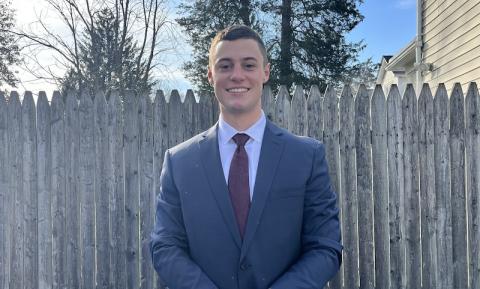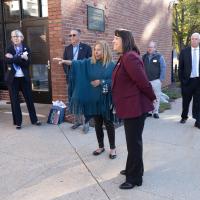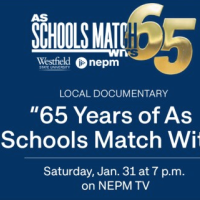
Student Profile: Bennett Kelly ’24

Bennett Kelly '24.
Bennett Kelly ’24 is a criminal justice major at Westfield State. Originally from Southampton, MA, he’s a first-generation college student and a member of the Criminal Justice Club on campus.
While Kelly always knew that he wanted to be a state trooper, his mother encouraged him to attend college beforehand, but to also work during the summers and make financially responsible choices. Westfield State made this easy, as Kelly said it was “affordable” to attend the University and that the reputation of the criminal justice department is what drew his interest.
“It’s top-notch,” he said about it. “I love my major, and I love my professors. I didn’t really love high school, but one thing I always liked was that my teachers knew who I was. They helped me. That’s one thing I really wanted to get in college, that student-teacher connection.”
Kelly prioritizes community on campus as well, attending most events hosted by the Criminal Justice Club. He recalled presentations made by survivors of domestic violence, state troopers and their K-9 counterparts, and interactive first aid training. “It’s watered-down versions of what’s out there for criminal justice students, which is really cool.”
Part of his college experience includes working with Alice Perry, associate professor of criminal justice and a former prosecutor of 30 years, to seek out various opportunities that would enable him to gain valuable experience as a student preparing to enter the police force. He described her as the “the best teacher ever” due to the palpable enthusiasm she displays in the classroom, and for the way she cares about her students. Over the summer, Perry even helped Kelly to secure a paid internship by putting him in contact with a former student who now works there.
During his stay there, Kelly described living with 45 men in the barracks area in Sconset, where he was based. Similarly to college dorms, the men shared common areas such as kitchens, living rooms, and basketball courts outside the building. The first week was spent training the individual candidates, and Kelly learned how to de-escalate social interactions in addition to using radios for communication. He was subsequently put on bike patrol and would do rounds across the island for 40-50 miles per day, making sure that people were safe and were helped with things like parking tickets, towing broken cars, and searching for lost pets.
While he credited Dr. Perry for helping to initially motivate him, Kelly said that he would not have landed his current internship if not for the mock interviews he did with the University’s Career Center. “It was the most helpful thing ever,” he said. “I had no idea what I was doing, but it was awesome. I left the interview for my internship with the job.”
His current internship is with the state police and requires him to collaborate with the District Attorney’s office to help with unsolved homicides and sexual assaults. Some of Kelly’s duties entail reading through case files, creating notes, uploading old files to the computer, and creating PowerPoint presentations due to the lengthy nature of case files. “Some of these files are 400-500 pages long,” he said. “Some people just forget things because they can’t remember everything. I’m just another set of eyes.
After graduating, Kelly will pursue a career as a state trooper, which consists of spending a few preliminary years getting accustomed to the role. For the first two or three years, Kelly would be placed into a troop based on his home address. Based on his current location, he would spend time in the western Massachusetts area and gain experience by doing “normal police work” before being placed in a specialized unit.
“There’s so many things you can be and hundreds of units you can go into,” he said. “College has helped me, though. I’ve talked to several state troopers that have come and talked to us in class. It’s rich exposure. I had no idea how to do anything, and I still don’t know everything, but I’m trying my best. With help from teachers and my peers, it’s been a lot easier.”


